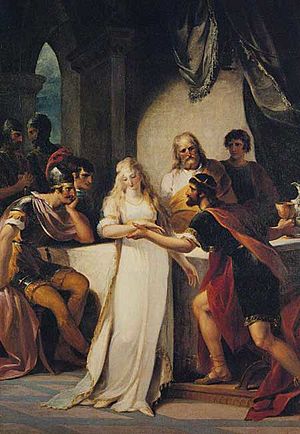Rowena facts for kids

Rowena was a famous woman in old British stories, part of what's called the Matter of Britain. She was said to be the daughter of a powerful Anglo-Saxon leader named Hengist. She also became the wife of Vortigern, who was known as the "King of the Britons".
It's important to know that we don't have many records from that time. This means we can't be sure if Rowena was a real person or just a character in these ancient tales.
Contents
What's in a Name? The Story of "Rowena"
The name "Rowena" isn't found in the very old English writings, like those by a historian named Bede or in the Anglo-Saxon Chronicle. These books talk about early English history.
The name "Rowena" first appeared in a book written in the 12th century by Geoffrey of Monmouth. His book was called Historia Regum Britanniae, which means History of the Kings of Britain. In his book, her name was spelled in a few different ways, like Ronwen or Romwenna. It's possible the name "Rowena" came from a Medieval Latin version of an older English or Germanic name that we don't know anymore.
Another idea is that the name comes from the Brittonic languages, which are old languages spoken in Britain. In Welsh, the name would be Rhonwen. Some people think this might be linked to the Welsh word for "horsehair" (Welsh: rhawn). This is just a guess, but it's interesting because her father Hengist and his brother Horsa are often linked to horses in stories.
Rowena in Old Stories
Rowena appears in several old texts, each telling a slightly different version of her story. These stories help us understand how people thought about her over time.
The Historia Brittonum
The Historia Brittonum is a very old book from the 9th century. It's often thought to be written by a person named Nennius. In this book, Rowena is mentioned as the beautiful, unnamed daughter of the Saxon leader Hengist.
Hengist and his brother Horsa arrived in Britain, landing on an island called Ynys Ruym (which is now the Isle of Thanet). Hengist then talked with Vortigern, the King of the Britons. Hengist asked for more land, and Vortigern unwisely gave him the Kingdom of Kent. This agreement caused big problems for the Britons and helped the Saxons gain a strong hold in Britain. The Historia Brittonum says that Vortigern and his wives (Rowena is not named directly here) died in a fire in a fortress in North Wales.
Geoffrey of Monmouth's Story
Geoffrey of Monmouth's book, Historia Regum Britanniae, written around 1138, was the first to actually give Hengist's daughter the name Rowena. In Geoffrey's story, Vortigern takes the throne of Britain from the rightful king, Constans.
Vortigern was very friendly with the Saxons and even let more of them settle in Britain. This made his sons from his first wife angry, and they rebelled. His oldest son, Vortimer, took the British throne and drove the Saxons out. However, Rowena poisoned Vortimer. In this story, Rowena acts like a wicked stepmother. Later, the Saxons tricked and killed many British leaders at an event called the Treachery of the Long Knives. They spared Vortigern because of Rowena.
Rowena in Welsh Tales
In old Welsh stories, like the Welsh Triads and medieval Welsh poems, Rhonwen (the Welsh name for Rowena) is sometimes called "The Mother of the English Nation." She often represents the idea of Saxon trickery and the old Anglo-Saxon paganism religion.
Rowena in Frisian Stories
In a book called Spiegel historiael (Mirror of History) by a writer named Jacob van Maerlant (from 1284–89), Rowena's father, Engistus, is said to be from Frisia (a region in Europe). Later stories from the 15th century even say he founded the city of Leiden. His daughter, Ronixe, is introduced in a famous book called Divisiekroniek (1517). From then on, Rowena was seen as a Frisian princess. In Frisia, it was a custom for women to greet visitors with a kiss. Because of this, Frisians began to believe that Rowena was the one who brought the custom of kissing to England.
Rowena in Modern Times
Rowena's story has been used and changed in many ways over the years. She was a main character in a play by William Henry Ireland called Vortigern and Rowena in 1796.
Her name was also used by the famous writer Walter Scott for a beautiful Saxon hero in his historical novel Ivanhoe (1819). After Ivanhoe became popular, the name Rowena started to be used as a common English given name. Before this, it wasn't used much, probably because the original legendary Rowena had some character flaws in the old stories.
 | Charles R. Drew |
 | Benjamin Banneker |
 | Jane C. Wright |
 | Roger Arliner Young |

